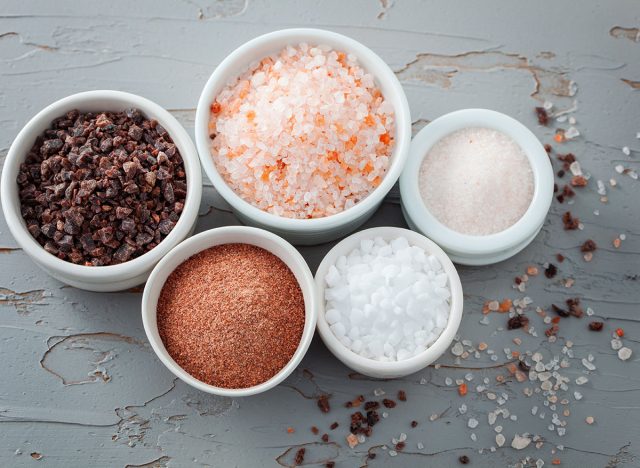This Eating Habit Can Lower the Risk of Disease and Death, New Study Finds

If you aim to eat a healthy diet, then you likely know that you should try to make plenty of vegetables and fruits part of your daily menu while keeping an eye on how much sugar, fat, and salt you’re consuming on a regular basis. If you’re getting too much of the latter three, it can lead to serious health issues. That’s why you may be interested to find out that new research has shown opting for a low-sodium salt substitute is a simple eating habit that can lower the risk of both disease and death.
In an analysis recently published in the journal Heart, researchers took a look at 21 trials that involved a total of 31,949 participants. While paying attention to how salt substitutes might affect health, the findings showed that each time the amount of sodium chloride dropped in a salt substitute by 10%, there was also a reduction in systolic blood pressure and diastolic blood pressure. Salt substitutes also offered protection when it came to cardiovascular events, cardiovascular mortality, and total mortality. The results were consistent across participants of different ages, locations, and trials.
“These findings are unlikely to reflect the play of chance and support the adoption of salt substitutes in clinical practice and public health policy as a strategy to reduce dietary sodium intake, increase dietary potassium intake, lower blood pressure, and prevent major cardiovascular events,” the researchers behind the findings explained, according to Medscape.

Indeed, Jen Hernandez, RDN, CSR, LDN, Registered Dietitian and Founder of Plant-Powered Kidneys, tells Eat This, Not That!, “salt substitutes can be a healthier option for many people. This is because the primary ingredient used for the salty flavor is potassium chloride instead of sodium chloride.”
Most Americans can benefit from decreasing their sodium intake, which is why salt substitutes are so appealing. “[Americans’] average sodium intake is 3,393 milligrams per day according to the US Dietary Guidelines for Americans 2022-2025 report,” according to Hernandez who notes that “this is approximately 1,000 milligrams over the American Heart Association’s recommended 2,300 milligrams or less daily allowance for sodium.”
Why potassium matters when it comes to salt substitutes
The most common type of salt substitute is potassium chloride, which provides a similar salty flavor without sodium. Not only does opting for a salt substitute like potassium chloride help you cut back on sodium but it also helps you increase your potassium intake.
Hernandez says that “most people don’t get enough potassium in their diet, which is why potassium is considered a public health concern,” and “why the new nutrition facts labels will require potassium to be listed.”
“The average intake of potassium for men is only 3,016 milligrams per day. The recommended amount of 3,400 milligrams per day,” Hernandez points out. “Women average 2,320 milligrams of potassium per day. However, the recommended daily amount of potassium for women is 2,600 milligrams.”
With that in mind, Hernandez says “using a potassium-based salt substitute is a very easy way to get more potassium in the diet without adding more foods.”
How to use salt substitutes to lower risk of disease and death
When it comes to choosing a salt substitute, Hernandez says that “the most popular types are either potassium based or monosodium glutamate based.” Hernandez also notes that although “some people may experience side effects with MSG, though it is generally recognized as safe to consume and can be another affordable salt alternative.”
You can use salt substitutes just like you would with table salt. Consider using salt substitutes whenever you’re baking, cooking vegetables, seasoning meat, salting pasta water, and more. These substitutes won’t always work as a 1:1 replacement in baking, so be sure to read the manufacturers’ recommendations for baked goods recipes.









